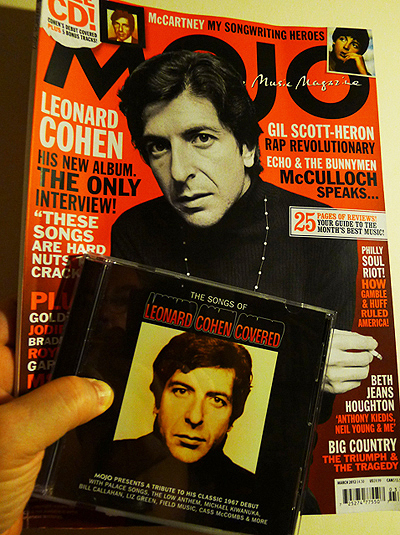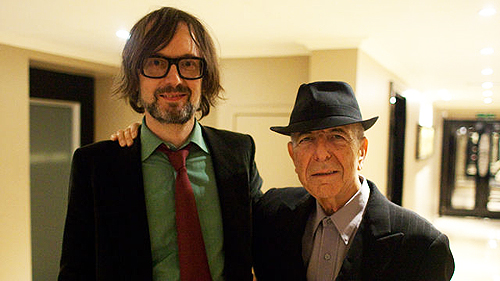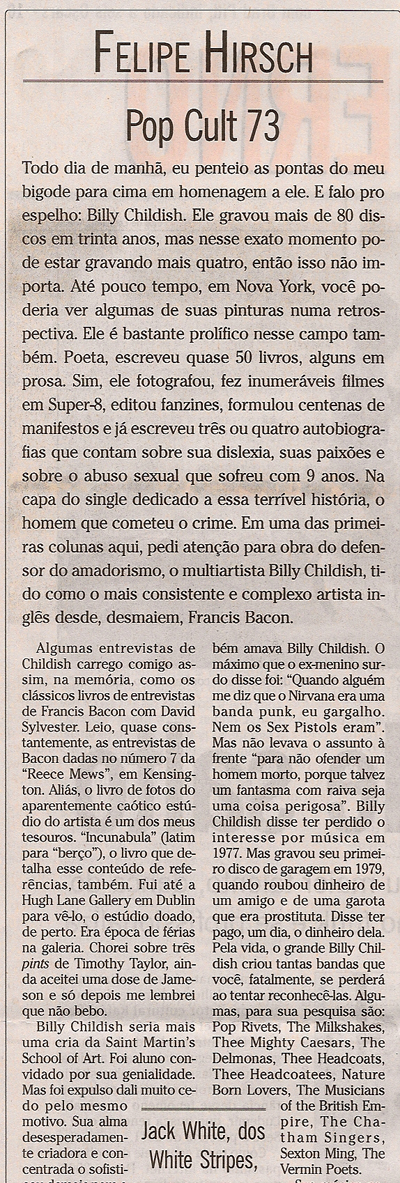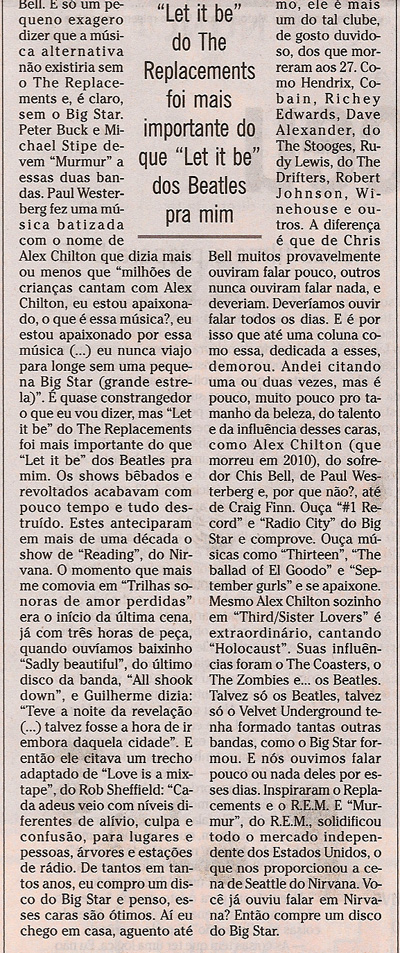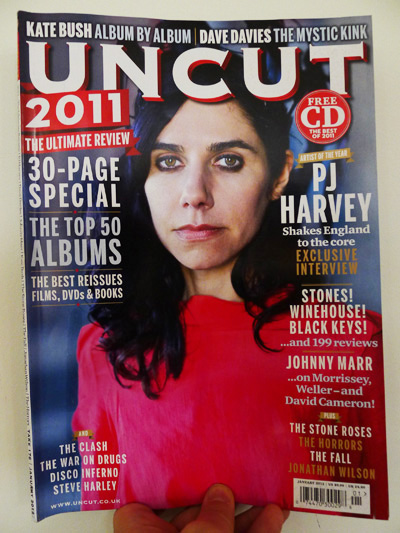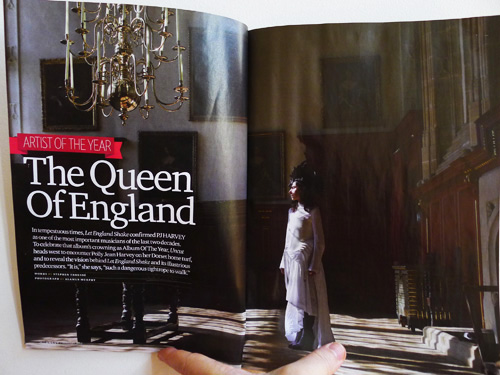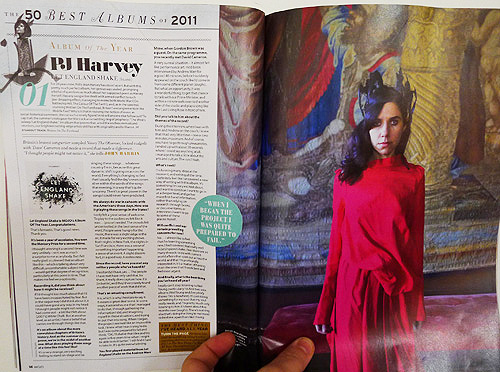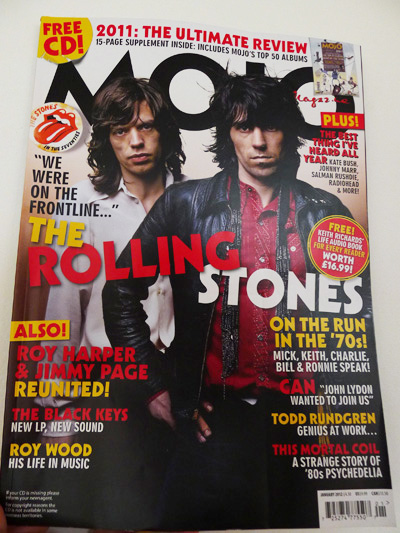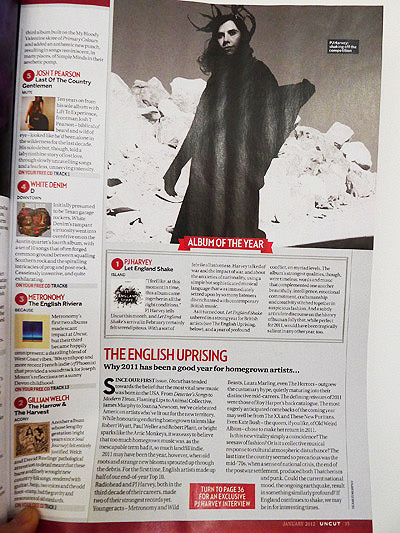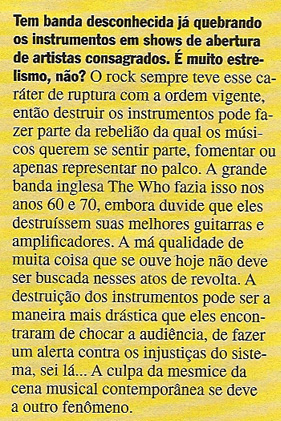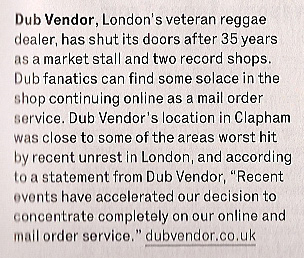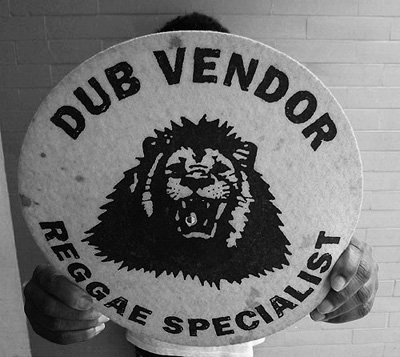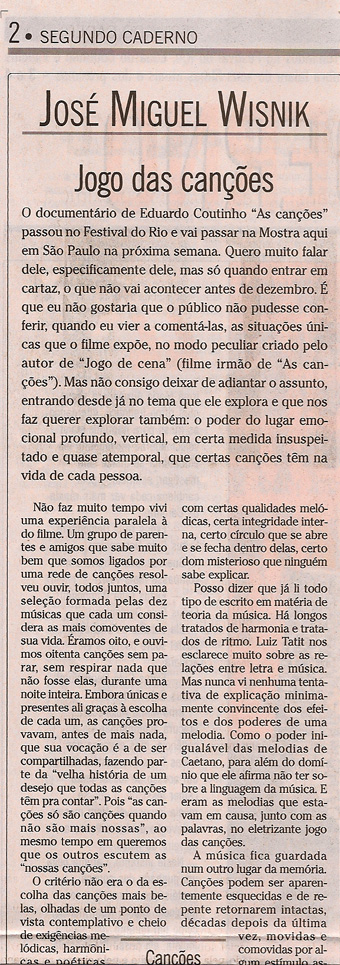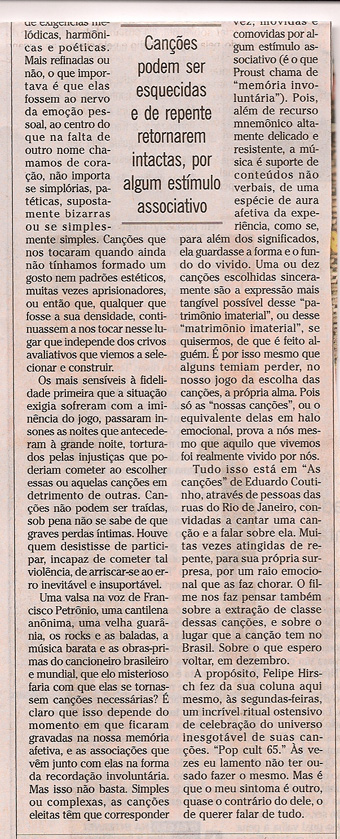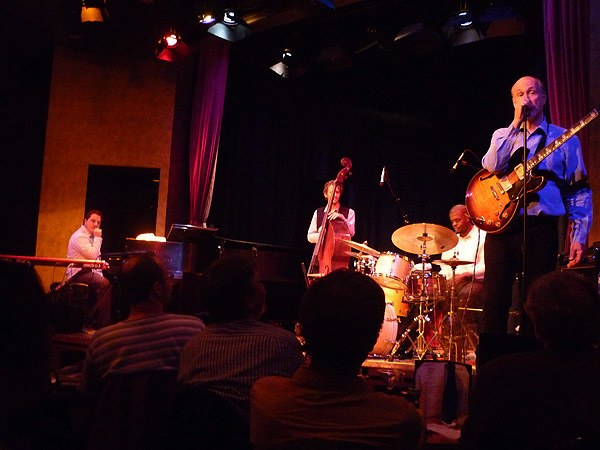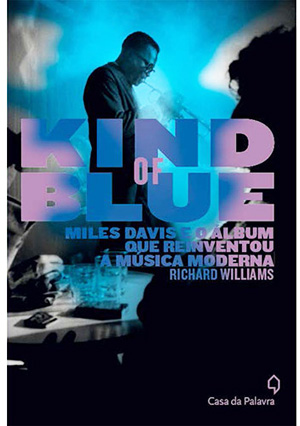Subject: morrissey“fala, maluco!
morrissey, em entrevista recente pra folha:
“Acho que todo mundo está deprimido com essa nova era da música porque parece que ela só se interessa por músicas sem sentido. Em todo o lugar que você vá, ouvirá músicas inexpressivas –tocam techno-dance em todas as lojas de departamentos, lojas de sapatos e elevadores, porque ninguém está realmente ouvindo aquilo. Você nunca vai ouvir uma canção com conteúdo social num salão de beleza ou na TV. Se você perguntar a uma vendedora de loja como ela consegue ouvir aquela música alta o dia todo, ela vai sempre responder: “Ah, eu me desligo”. É assim a música moderna. Você não tem a permissão de escolher a canção que quer escutar. Você é bombardeado na cabeça com música que outros escolhem para você ouvir. E assim ela se torna insignificante.”
e é por isso que ilhas de boa música como o ronca ronca não podem ser inundadas por essa mediocridade… aliás, alguma novidade sobre o futuro do programa, e sobre o NOSSO futuro? tá ficando sinistro esse bagulho… mais uma vez vou perder o ronca porque mais uma vez tenho um plantão pra dar na maternidade-escola aqui de fortaleza (ah, sou estudante de medicina). só espero que pelo menos não se esqueçam de colocar o áudio do programa na nete.
abraço e vida longa ao ronca ronca,”
filipe, de fortaleza.
Arquivo da categoria: imprensa
leonardão & jarvis…
estupidez, grosseria, brutalidade… esta edição da MOJO!
aliás, como sempre!
o início de 2012 está marcando a longevidade e, sobretudo, a música incomum de leonard cohen.
aos seus contemporâneos e súditos, restará abrir a boca de espanto… prender a respiração e pensar:
Deus salve leonard cohen!
coincidentemente – ou não – semana passada, arrudinha (froNt capixaba) enviou um “pombo sem asa” sobre a presença de mister cohen no programa de jarvis cocker (pulp) na BBC radio6.
como sempre, comi mosca e não consegui conferir a visita… mas dei uma olhada nas listas dos programas colocados no ar pelo jarvis, por onde eu não passava há um tempão… e, felizmente, identifiquei um semelhança muito grande na desorientação dele, na radio6, com um certo jumboteKo tupiniquim.
( :
aqui embaixo, estão as relações de músicas tocadas nos dias 22 e 29 de janeiro.
caso você queira mais, basta dar uma procurada no google – jarvis cocker BBC radio6!
a grande estrela…
a coluna de felipe hirsch – toda segunda feira no globo – segue como uma das mais importantes fontes de (in)formação que temos no brasa.
e mais, segue pautando o roNca roNca… já que muitos de seus leitores querem ouvir big star, the replacements, alex chilton, the hold steady, arthur lee, chris bell & cia ltda… todos citados nas letrinhas de hoje!
onde mais ouvir esta tchurma?
BINGO!
captou?
refletiu?
ok, muitos dirão que minhas previsões sobre a posição de polly nas listinhas de fim de ano… foram armadas!
sim, que eu teria usurpado, num climão teixeirinha & seus bluecaps… que eu teria lafrado!
hahaha…
o importante é que p.j harvey faturou os primeiros lugares na MOJO, UNCUT e NME!
e ficou entre os cinco mais em uma penca de outras publicações!
barbada… let england shake!
( :
marcelo mandou pra gente…
PRK-30: soberbos e abobalhantes
Todas as sextas à noite, antes de existir televisão, a família se reunia em torno do rádio. Apagavam a luz e ouviam “PRK-30”, um programa de humor criado pela dupla Lauro Borges e Castro Barbosa, que parodiava atrações da época (noticiários, novelas, shows de calouros, transmissões esportivas) e caricaturava os clichês da radiofonia.
A PRK-30 se apresentava como estação clandestina e permaneceu por 20 anos no ar, de 1944 a 1964, exercendo influência sobre toda uma geração de comediantes.
Há pouco, a editora Casa da Palavra lançou um livro com dois CDs remasterizados -“No Ar: PRK-30”, de Paulo Perdigão-, que foi como conheci a verve retórica dos locutores Otelo Trigueiro e Megatério Nababo d’Alicerce (respectivamente, Lauro e Castro).
Um roteiro típico: o português Megatério introduz o prefixo musical do programa, completamente desafinado e “executado com a coragem habitual por uma descongestionante orquestra de violinos de vara e trombones de corda”.
Mas logo interrompe a desengonçada banda com um: “Chega! Não precisa caprichar tanto!”. E elogia a valsa que acabaram de tocar, “em compasso de ópera, ritmo de conga e marcação de bugre-bugre”.
Separados por uma gongada, os quadros duravam segundos ou não eram sequer transmitidos (depois de anunciados, mudava-se de assunto). O humor era desprovido de cinismo, não apelava para a grosseria, não ofendia e recaía num desvairado nonsense, com total desrespeito às normas linguísticas.
A PRK-30 era uma rádio 48% honesta, um colosso que seguia de popa em vento e uma emissora que raramente provocava náuseas em seus delicados ouvintes, veiculando as mais “avariadas” notícias de todas as partes do mundo e adjacências.
Desdenhavam-se as outras estações de rádio, “que encerraram suas atividades porque quando nós começamos a ‘funcionejar’ fazemos um completo ‘manepólio’ das ondas ‘artrosianas'”.
Em “soberbas e abobalhantes” transmissões, Lauro e Castro exploravam o avesso das coisas. Eram reis do trocadilho tolo e da adjetivação furiosa. Não faziam graça do que era dito, mas de como era dito.
Ainda hoje os humoristas da TV teriam muito a aprender com Otelo, dono de uma “voz suave e quase destituída de gosma”, e Megatério, o único locutor que já mordeu a língua mais de dez vezes sem ter tido hidrofobia. E que sabia “falar inglês em vários idiomas”.
Vanessa Barbara (Ilustrada / FSP)
letrinhas do palmeirense indie…
publicadas no caderno de esporte da folha/SP:
Lúcio Ribeiro – Peladeiros da Colina
Com o time mais legal do Brasil, o Vasco nos representa contra o futebol modernoQuando o zagueiro Dedé fez uma jogada de meia habilidoso e correu à área para marcar um gol de centroavante oportunista, ele “reclamou” com os companheiros que vinham abraçá-lo, extasiados com um gol tão importante num jogo tão difícil, em uma semana tão iluminada, dentro de um ano tão abençoado.
Era o segundo do Vasco no clássico com o Botafogo, anteontem, selando a vitória que manteve o time grudado no Corinthians na disputa do Brasileiro. Quatro dias após o feito heroico na Sul-Americana, que o botou na semifinal do torneio. No ano em que o Vasco já vai a campo com duas glórias: a de campeão da Copa do Brasil e dono de uma vaga na Libertadores de 2012.
Dedé não queria abraços. E sim enfileirar os amigos de time para puxar o “trem-bala da Colina”. A celebração de gol tradicional do Vasco em 2011 lembra os tempos do “Expresso da Vitória” dos anos 40 e remete ao estado de espírito atual dos vascaínos: um trem da alegria puxado por Dedé, o “Neymar do Vasco”, o Dedéckenbauer.
Que os vascaínos estejam felizes com o time é óbvio. Mas acontece que muitos fãs de outros clubes, mesmo os rivais, também estão ficando simpáticos à esquadra de São Januário. O Vasco é o “time mais legal do Brasil”, permita-me criar tal categoria. Em meio a tantas boas notícias cruz-maltinas, essa é “a” notícia.
Sob a era Eurico Miranda, como presidente ou como vice mandando mais que o presidente, o Vasco passou anos sendo o “time mais chato do Brasil”. Amigos vascaínos disseram ter sentido na pele o que era torcer para o clube quando ele ganhou fama pelas tais “vascanagens”.
Agora, depois de um tempo na Série B (2009) e de reajustes internos, o Vasco é um novo Vasco. Para além de seus torcedores. O que aproxima mais o clube de uma empatia nacional é o espírito de jogo. O time luta partida a partida contra uma das coisas mais insuportáveis do futebol moderno: “poupar jogador para torneios mais importantes”. A tal história de que um campeonato vale menos pelo título dele em si do que uma classificação para um torneio “mais relevante”. Atualmente, uma competição é sempre um degrau para outra.
Só que o Vasco parece não pensar assim. O time não poupa ninguém. Resgatou o “vencer por vencer”, porque ninguém gosta de perder. Na sua pelada, que não vale nada e não rende nenhum tostão, é assim, caro leitor. Ou foi assim. Ou será.
No fim do jogo contra o Botafogo, Dedé saiu com cara sofrida por causa de cãibras. Mas, à beira do gramado, fez questão de falar que nada o tira do duelo com o Palmeiras em São Paulo, amanhã. Hoje, no futebol moderno, o Vasco nos representa.
sopa!
Não é possível…
por RicaPerrone (globoesporte.com)
Não, não é possível. O Vasco é campeão da Copa do Brasil, disputa o Brasileirão na contra-mão do que faz a maioria quando leva a Copa e ainda não está tentando se livrar da Sulamericana. Pior do que isso? Lidera o Brasileiro com o Corinthians e está nas semi da Sulamericana.
Não satisfeito em buscar, está chegando. E ontem o que mais repeti vendo a história ser escrita foi “não é possível”.
Time titular faltando 5 rodadas no Brasileirão com 3 clássicos por vir? Não é possível… É um sonho ou algum clube se tocou que ninguém morre jogando duas vezes por semana?
A bola rola, o tal do Universitário não a encontra. O Vasco deita, rola, finge de morto e faz 1×0.
Bola na área e o mediocre atacante deles bate de primeira por cobertura… Não é possível que ele tentou fazer aquilo. Mas fez.
Juninho, experiente, se joga na área pra simular um pênalti. Porque não chutou? Não é possível que tenha preferido cavar do que tentar o gol…
Fim de primeiro tempo, empurra-empurra.
Na volta Diego Souza expulso. Não, não é mais possível.
Dois minutos depois o time dos caras dá um chute sem vergonha da entrada da área, bate no Dedé e entra. 2×1, acabou.
O Vasco tem que fazer mais 4 gols em 45 minutos pra conseguir a vaga. Não é possível.
Bola na área, Elton de cabeça, 2×2. Correria, pega a bola, volta correndo, aquela cena toda, mas…. não era possível.
Dedé resolve, então, virar atacante. Não satisfeito em ser o melhor zagueiro do país disparado, desafiou a lógica e partiu.
Virou ponta direita. Recebeu, cruzou, entrou. O goleirão aceitou, é verdade. Mas aquele 2×1 contra de minutos atrás agora era um 3×2 que ainda deixava esperanças.
Faltam 2. Mas será possível?
Pressão, caldeirão fervendo, torcida em pé, time vibrante e os peruanos assustados.
Aos 27, o candidato a atacante conquista a posição. De cabeça, Dedé faz 4×2 e o Vasco precisa de apenas um gol para conseguir o impossível.
Eu, confesso, em pé diante da TV, repetia em voz alta: “Não é possível…. “.
A senhora Perrone passava pelo quarto sem entender muito bem que euforia era aquela e eu tentava explicar: “O Vasco tá quase…. Não é possível, não é possível!”.
E aos 37, Dedé desvia, Alecsandro empurra, o Vasco torna o impossível real.
Tá, eu confesso sem medo! Gritei gol e não fui só eu. Conheço alguns que não tinham nada com isso e que também se envolveram com a virada a este ponto.
Em 45 minutos o Vasco conquistou 4 gols, a torcida, a vaga na sulamericana e qualquer sujeito que estivesse na frente da TV sem ser flamenguista, tricolor ou botafoguense.
Estes, convenhamos, tem anti-corpos suficientes pra não se envolverem.
Era possível.
O Vasco dava outra aula de vontade, ousadia e vergonha na cara. Quantos ali entregariam no 2×2 só pra não sair da competição perdendo?
Quantos iam querer levar a Sulamericana a sério já tendo a vaga?
Porque só pro Vasco título é título e dane-se a tal da vaga?
Porque o Vasco está sendo tão mais ousado, inteligente e corajoso do que os outros ao disputar tudo que tem pela frente?
E se perder o Brasileiro por causa da Sulamericana e, talvez, ficar sem os dois? Dirão os comentaristas de resultado que não valeu a pena?
Valeu, já valeu.
O ano de 2011, seja com título de Sulamericana ou não, com Brasileirão ou não, já é do Vasco.
Eu pensei que “não era possível” um clube trocar o ódio que o país todo sentia em virtude do seu ex-presidente por simpatia.
Pensei que o Vasco estivesse eternamente rotulado pela lamentável postura do Eurico que fez do clube o mais odiado do país.
Hoje, não. Com Roberto, com Ricardo, com essa postura e sem pisar em ninguém por estar em cima, o Vasco reverteu também esta imagem.
Sim, o Vasco é o time da virada. O Vasco é o time do amor.
Duvida? Cai dentro do Caldeirão pra ver se não vira sopa…
léo (pai de larinha) mandou pra gente…
Somos todos bregas
O antigo mau gosto musical virou convicção no Brasil
Luíz Antômio Giron
Discos sempre foram para mim fontes de descoberta. Talvez o hábito de ouvi-los tenha ficadp fora de moda por causa da internet e da pirataria, mas nada se compara em nitidez sonora a um CD feito com plástico, alumínio e bits sonoros. Pois ontem escutei dois discos de duas cantoras representantes de faixas de público aparentemente diversas que me ajudaram a refletir sobre a atual situação da música popular brasileira: O que você quer saber de verdade (EMI), da cult MPB carioca Marisa Monte, e Ao Vivo(Universal), da mineira e sertaneja Paula Fernandes.
Há dez anos, para não ir muito longe, minha experiência sonora seria considerada abstrusa, pois obviamente duas artistas de registros tão diferentes iriam apenas mostrar a multiplicidade da música brasileira – e reafirmariam minhas convicções em relação àquilo que é refinamento e singeleza. Marisa, representante da alta cultura; Paula, das camadas populares. Mas minha experiência não se deu assim. Antes pelo contrário: o que eu ouvi nos dois discos são cantoras quase idênticas, entoando baladas românticas muito simples, acompanhadas por instrumentos acústicos, repletas de uma versalhada tida antes por piegas, tresmolhados de bons sentimentos e mensagens de amor nada discretas. Ambas seriam chamadas de bregas no Brasil Velho. Nos anos 60 e 70, a música romântica influenciada pelo bolero, a modinha e a toada caipira era considerada um produto barato, para uso do povão. Nos 80, bandas da vanguarda paulistana e cantores como Eduardo Dussek exploraram a verve paródica, meio que esnobando o brega, mas lucrando com o gênero. Depois da apreensão ingênua e da paródica, as pessoas assumiram o gênero com pungente fé. Hoje o brega é a convicção de um povo. Ele se consagrou. Marisa e Paula, duas grandes artistas vocais brasileiras, assumem com serenidade o novo bom gosto. Uma prova de que o brega se converteu em cult –e vice-versa.
O cult está brega. Isso quer dizer que o cidadão brasileiro cool e descolado se vale de todo tipo de referências para compor a sua roupa, seu modo de agir e seu imaginário. Esse novo comportamento reflete a mudança demográfica do país, com a ascensão das classes C e D. Essas camadas se tornaram importantes e terminam por impor seu gosto, seus hábitos e costumes ao restante da sociedade de consumo. A gente vê isso na novela Fina Estampa, da TV Globo, de Aguinaldo Silva. Ela relata a ascensão social da pobretona Griselda (Lília Cabral), que de quebra-galho se torna empresária. A novela não maquia a luta de classes, e mostra o conflito entre a emergente Griselda e a socialite Maria Teresa (Cristiane Torloni). Baseado em pesquisas, o autor faz um retrato realista de como a mulher brasileira se tornou chefe de família, está galgando posições – e, no universo da cultura, obriga a turma do narizinho empinado a prestar atenção no que ela gosta, no que ela sente, pensa e consome. Esse “ovo Brasil” é uma realidade insofismável. É preciso considerá-la e respeitá-la. Os novos-ricos e os novos-classe-média vieram para ficar e se mostrar, para horror das marias-teresas da vida.
Além da novela, o cinema brasileiro tem explorado, de uns cinco aos para cá, o universo da nova classe média: são favelas que enriquecem com o tráfico e o tráfico que domina os “bem-nascidos”(Tropa de Elite 1 e 2, Meu nome não é Johhny), mulheres que lutam para sobreviver sem preconceito (O céu de Suely,Bruna Surfistinha, De pernas para o ar), formas de arte em extinção que insistem em se manter vivas (O palhaço, Suprema Felicidade), personagens que questionam a identidade e os tabus sexuais (Se eu fosse você 1 e 2). É um novo mundo que se descortina, e talvez não se coadune com aquela ilha da fantasia sonhada pelos estetas, que hoje só sabem admirar o cinema classe-média-bonitinha da Argentina. Infelizmente (eu diria felizmente), o Brasil não é a Argentina. O Brasil se mostra muito mais rico e variado em termos demográficos e, por isso, culturais. Se é cultura “inferior” nos padrões europeus, paciência.
Os gostos, os hábitos, os amores e os ventos mudam, já dizia o poeta seiscentista Luís de Camões. Até a novidade sofre tantas e tamanhas metamorfoses em sua estrutura que chega o dia em que as coisas mais antigas, descartáveis e antes desprezíveis viram artigo de luxo. Experimentamos hoje o choque do velho, em contraposição ao que preconizavam as vanguardas artísticas até os anos 1920. No terreno da música cultura de massa, o processo se acelera ainda mais. Não apenas velhos paradigmas voltam à tona – trata-se de uma forma de reciclagem rápida dos produtos culturais – como também os usos e costumes de classes sociais antes antagônicas começam a interagir e a se fundir de forma irreversível, alterando o que se pensa sobre o mundo e como se consome arte, entre outras coisas.
Mas voltemos à música, que sempre foi a antena das tendências por aqui, e, apesar de viver momentos não muito brilhantes, continua a ser uma arena de mudanças. O que tem acontecido na música brasileira é uma quebra de paradigma. Caiu a hegemonia do eixo Rio-São Paulo. A música axé da Bahia tomou conta do país inteiro, e gerou estrelas como Ivete Sangalo, Claudia Leitte e Carlinhos Brown. O interior invadiu as capitais, e surgiu o forró universitário e, mais recentemente, o sertanejo universitário. O funk se fundiu com o samba e a MPB. E vieram para baixo os sons amazônicos. ÉPOCA publicou recentemente uma reportagem intitulada “E o brega virou cult”, de Mariana Shirai, sobre o gênero tecnobrega paraense e sua influência no movimento Avalanche Tropical, que congrega bandas e DJs bregas do país inteiro. Dessa enxurrada fazem parte a cantora Gaby Amarantos, Garotas Suecas e a Banda Uó.
O que as vertentes do pós-bom gosto ensinam? Em primeiro lugar, que é inútil ter preconceitos musicais, porque ela é invasiva mesmo, capaz que é de se apossar de sua alma. Em segundo, que aquilo que é considerado de mau-gosto na verdade ajuda a enriquecer a imaginação. Em terceiro, que nada é fixo no mundo, e nada mais dinâmico e pervasivo que o som. Quarto, torna-se urgente reavaliar nossas próprias crenças artísticas.
Por isso, finalmente o “populacho” e os “caipiras” invadiram os salões. Na nova geopolítica sonora do Brasil, podemos ouvir os ecos do brega na voz de Marisa Monte, e traços de erudição na de Paula Fernandes. Junte as duas e o resultado será parecido com Vanessa da Mata, uma acoplagem do sertanejo e do alto pop dançante. Junte a duas e você ouve a volta ainda não anunciada de Zezé di Camargo & Luciano. Você vai entender nas entrelinhas o tecnobrega, a axé. Junte-as em uma audição e você comporá o seu rosto. O Brasil joga na nossa cara quem e como somos de fato. Querendo ou não, se fazendo de culto ou nem tanto, você é brega, meu velho.
(Luís Antônio Giron escreve às terças-feiras.)
retirado do revistaepoca.globo.com
tudo surrupiado do site allan sieber, semana passada…
TOM WAITS
No The Guardian de hoje.

Um belo trecho:
He is, he says, equally wary of the ease of search and shuffle. “They have removed the struggle to find anything. And therefore there is no genuine sense of discovery. Struggle is the first thing we know getting along the birth canal, out in the world. It’s pretty basic. Book store owners and record store owners used to be oracles, in that way; you’d go in this dusty old place and they might point you toward something that would change your life. All that’s gone.”
*********************
É isso aí, tá tudo muito fácil. Acho inclusive que foi toda essa facilidade que produziu a geração mais bundona de todos os tempos, essa que está aí com seus iPhones enfiados no cu e um bonezinho com uma marca gigante na cabeça. Ninguém quer procurar, fazer esforço, CONSTRUIR alguma coisa. Não, o negócio é ficar na merda do facefuck o dia inteiro recebendo uma coisa “engraçadinha” depois da outra e passando adiante. São mimados inúteis que jamais tomarão qualquer responsabilidade para si e seu grito de guerra é “Tá de boa”. Caralho, nada irrita mais que ouvir essa merda, “tá de boa”.
Allan Sieber
menos uma!
– “maurição, tô muito chateada, aporrinhada, triste pra meirelles”
– “pô, risada… tô mimindo. pô, são 7 da matina. caraca”
– “pô, maurição. levanta, você precisa me ajudar… anda”
– “risadinha, vai lá na padaria comer um joelho e me liga às 9, ok?”
– “não… preciso te falar uma coisa muito triste”
– “tá bom… anda, criança, desembucha”
– “maurição, lembra que eu fiquei com uma das duas revistas wire que seu amigo trouxe?”
– “ahn… anda”
– “você não sabe… sabe?”
– “caraca, risadinha, fala logo antes que eu perca o sono de vez”
– “tá bom, vou falar. é o seguinte a dub vendor acabou”
– “porra, hein? como é?”
– “isso, maurição. tem uma nota aqui nessa merda da wire dizendo que as lojas acabaram. agora, só na web”
– “pô, risada… que bad trip. agora, lascou. perdi a porra do sono. vou aí ver essa desgraça”
– “vem logo e traz uns compactos de lá que você sempre tocou… e traz a parada que você usa há anos na vitrola”
sim, risadinha estava certa… a DUB VENDOR, principal loja de reggae em londres, fechou as portas!!!
PQParille!!!
olha a nota…
sinister!!!
e assim, não consigo parar de pensar na indagação de lucio “mister white”:
– quem disse que o mundo não acaba?
enfim, sobrou o “feltrinho” nas mãos de risadinha…
torcida descabeladaça… mas afinadona, em todos os cantos!
Subject: jogo de música“Mauval
Hoje lendo a crônica do Zé Miguel Wisnik me lembrei muito do Ronca, do aniversário de 300 programas, da paixão de vcs e de nós que fazemos juntos uma corrente de emoção que gera um programa muito bonito, forte e tantas outras coisas mais.Compartilho a crônica que gostei e sei que vc vai gostar tb!Beijo grandeAte terça!Carol(Rio de Janeiro)
Subject: agradecimento
“cara, passando rapi10 só pra agradecer pela tua teimosia em continuar botando o ronca ronca pra voar com música boa e de qualidade. ontem assisti a um showzaço do marcelo jeneci aqui em fortaleza, embora um pouco frustrado pela ausência de tulipa ruiz. brigadão por me apresentar a jenecis, tulipinhas, ortinhos, tiês, criolos e cia. (e eu aqui sempre na peleja pra ouvir o ronca pela internet…)
e como diz otto: “manda música, manda música! ronca ronca: o melhor, o melhor!”
haha abraço,filipe. (fortaleza)
+
Subject: John Scofield“Fala, Mauval. Saudações vascaínas.Tudo bem por aí?Ontem eu estive em Oakland (CA) pra conferir o John Scofield Quartet.É a segunda vez que o vejo. A primeira foi em Rio das Ostras (RJ). Realmente, o cara é um dos 3 melhores guitarristas de jazz vivos. Dizem que se apresenta em 200 dias por ano. Segue uma foto.”
Abração,
Vinicius (Berkeley / USA)+
viajar é preciso!
volta e meia coloco pra fora meus delírios envolvendo discos e suas Histórias.
já até recomendei o tema como um provável documentário… ou filme de “ficção”!
lembra a pauta?
os caminhos dos discos, por onde eles passaram, quem os agarrou, beijou… em quem foram arremessados…
como trocaram de mãos… enfim, não faltaria assunto.
mas, no meu caso, quando pego um determinado disco antigo viajo na maionese de que ele já pode ter sido ouvido por um eric clapton, hendrix, dylan… manja?
aconteceu isto, semana passada, quando toquei o compacto inglês do chuck berry. o disquinho, que não tem data, certamente foi lançado – no máximo – no início dos 60… portanto, quem vai me cortar o barato de que ele – o compacto – não passou pelas mãos de ray davies do kinks?
ontem, revendo a edição especial da revista life sobre george harrison, esbarrei nesta foto:
pois bem, quem vai me convencer que este Lp, no suvaco de macca, não é – exatamente – esta cópia aqui que acabei de registrar?
segura aí que vou dar uma cafungada no disco pra saber se paul estava com o desodorante vencido!
( :

